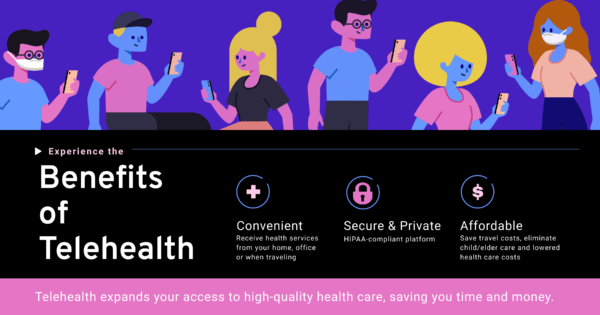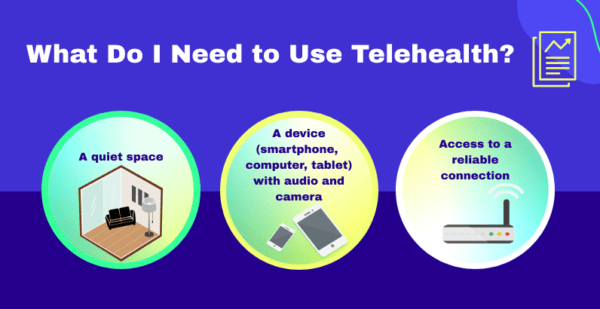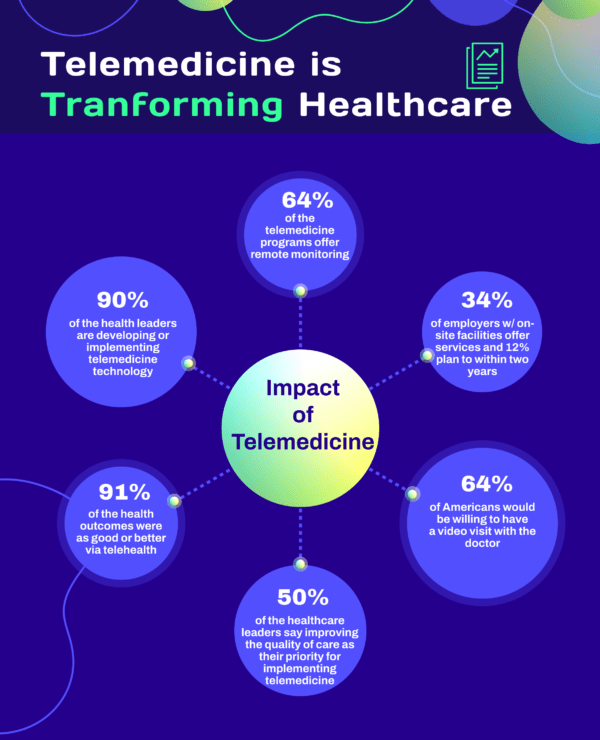Out of the many economic and cultural effects of the worldwide Covid-19 pandemic, one of the most fascinating has been the sudden growth in telehealth services. An innovation that, in just 2019, was only emerging is suddenly widespread and revolutionizing how we get medical services. From first aid to mental health, telemedicine just makes sense in our new normal. And one sector that can really benefit from telehealth services – whether the know it yet or not – are small businesses.
So Business Pundit is here to review our favorite telehealth providers, with an eye toward the ones best suited for small businesses. Here’s the short version:
For full profiles and answers to your questions, keep reading!

What are Telehealth Services for Small Businesses?
The telehealth services definition varies depending on the provider and services required. Telehealth services are also called e-health or mobile health (m-health) services. They provide accessible healthcare to those who live in isolated communities. Telehealth services also ease the burden of healthcare for those with limited transportation or mobility. Patients can gain access to providers and receive assistance managing their healthcare. Additionally, telehealth services improve coordination among patients and healthcare professionals.
Small businesses can use telehealth medicine to save money for the company and employees. Employee engagement in telehealth services has increased since the pandemic but remains low in many areas. In general, more education is needed on the cost-reducing impact of telehealth services for common illnesses.
Here are some of the more common components that fall under the telehealth services meaning for small businesses:
- Teleconsultation: This involves a virtual consultation between a physician and other telehealth services providers and their patients.
- Telediagnosis: Telehealth services providers can also monitor employees’ health data and vitals gathered by wearable technology. This allows for more accurate diagnoses following remote exams.
- Telepharmacy: Employees contact pharmacists to receive refill authorization and learn more information about their prescriptions.
- Telerehabilitation: Rather than convalescing in a rehab facility, patients wear hardware so that healthcare officials can track their recovery.
- Telemental health: Those with mental health concerns or conditions can receive psychological help via text, video chat or email.
Telehealth Services
The telehealth services meaning also includes the types of care available, including virtual appointments, remote monitoring equipment, and personal health apps.
Virtual Appointments
Some clinics or physicians’ offices offer virtual appointments where patients can seek the advice of a nurse or doctor through video conferencing technology. These appointments allow patients to see their regular doctor without traveling to the office.
Remote Monitoring
There are numerous technologies that allow healthcare providers to remotely monitor a patient’s health. These include mobile apps that monitor blood glucose and vitals and report them to the patient’s primary care physician or specialist. Additionally, remote monitoring devices can measure such things as lung function and blood pressure and wirelessly report them to the appropriate healthcare professionals.
Wearable devices also transmit heart rate, tremors, physical activity, gait, posture and sleep patterns.
Doctors Talking to Doctors
Telehealth services allow doctors and specialists to communicate regarding care for their patients. Virtual consultations sometimes include more than one doctor. This can help keep the patient in the loop or allow doctors to save time by comparing notes online.
Personal Health Apps
The telehealth services definition also includes the many health apps available to consumers. These apps record vital signs and store a patience health information without compromising privacy or security. They can also include schedule reminders for medication, track nutrition and caloric intake, and provide a daily step count.

Business Pundit’s Best Telehealth Services for Small Business
So now that you know what telehealth services can provide for small businesses, what companies are on Business Pundit’s ranking? To rank these companies, we considered factors including their value for cost, the range of services provided, their customer service, and more.
1. SteadyMD
SteadyMD provides online urgent care. The company focuses on the customer experience and has experienced increased demand for at-home services. Patients can request consultations with member physicians in all 50 states. the service uses live videoconferencing for these consultations.
Participating physicians can increase their revenue and demand and provide vital service to patients at home. The company also manages at-home diagnostics and lab tests. For this side of the business, patients order the test and send them in for lab testing.
SteadyMD reviews the orders and determines whether the test is necessary. Online visits can be in real-time or through digital communication. Providers who sign on with the company receive regulatory, legal and clinical governance. As a tech-enabled pharmacy, SteadyMD integrates a customer AMR with health records and helps providers forecast the demand in their state.
2. Teladoc
Patients can set up a Teladoc account in minutes. The company has a convenient app and patients call 1-800-Teladoc to sign up or receive services. After filling out a brief form, patients can connect to the right medical provider.
The therapists, doctors and specialists at Teladoc handle mental health issues such as stress and anxiety as well as physical issues such as the flu, infections, and chronic illnesses.
The company has different plans that include tiered services based on what the plan sponsor chooses. Small businesses can also engage the service for prescriptions for their employees.
3. Tyto
When patients need a board-certified doctor after hours or in the middle of the night, Tyto is available. Tyto is available 24 hours for virtual urgent care. Members can even get an online exam and then send it to their own doctors. Doctors can access emails through the companies HIPPA-compliant portal.
Patients typically pay $59 for services that aren’t covered by their plan sponsor. Some insurance providers also pay for Tele health visits which would cover TytoCare. Further, those with insurance typically pay the normal copay for their plan.
4. MDLive
MDLive service varies depending on the patient’s insurance coverage. The service can provide treatment for allergies, cold and flu symptoms, birth control, COVID-19, coughs, headaches, ear pain, pink eye, rashes, infected insect bites, sinus issues, and a plethora of other services.
Behavioral health services vary between $0 and $108 depending on insurance coverage. Psychiatry services also vary and cost up to $284. MD Live Provides services for addictions, anxiety, caregiver support, depression, grief, bipolar disorder, LGBTQ support, OCD, and a variety of other mental health concerns.
Many people find telehealth services beneficial to preserve their privacy and let them talk freely in a comfortable place. the company has provided successful services for trauma and stress management and many types of mental health disorders.
Telehealth services for dermatology include acne, boils, hair loss, cysts, cold sores, eczema, hives, warts and moles, among other services.
5. Amwell
With Amwell, patients download a mobile app to get healthcare anywhere. This 24/365 service gives members access to emergency care no matter where they are. As long as patients have Internet, they can receive care when they need it. The company website boast “no germy waiting rooms” and no waiting for treatment.
Amwell also handles prescriptions that they conveniently sent to your pharmacy. Urgent care visits cost $79 and regular physician consultations are even cheaper for those with health insurance.
Here are some of the services covered by Awell healthcare providers:
- Acne
- Flu
- Gout
- Stomach Flu
- Bug Bites
- Cold Sores
- Strep Throat
- UTI
- Pink Eye
6. Doctor On Demand
Patients who want the convenience of around-the clock-access to psychiatrists, therapists, doctors and other experts can rely on Doctor on Demand. Patients often return to the same providers for exams and therapy sessions via their computer, smartphone or other device.
Over 98 million Americans can receive assistance for Doctor On Demand through their employer or current health care plan.
Patients can receive treatment for physical and mental conditions for everything from colds to diabetes management to stress management. The company connects providers and patients without the need of a physical office.
Doctor on Demand provides virtual urgent care and participants can connect with a medical expert almost immediately. Those with behavioral health issues can remain at home while they receive assistance. The service also provides preventive health care and advice on living a more healthy lifestyle. Additionally, many patients find assistance for chronic conditions in this convenient format.
7. K Health
K Health coverage starts at $9 a month and covers everything from sexual health to the flu. Service is available around the clock to answer concerns about symptoms and help patients stay on top of their health maintenance. Members receive free care for children aged 3 and above. Additionally, men and women receive care for anxiety disorders and erectile dysfunction, among hundreds of other health concerns.
8. Maven Clinic
Maven Clinic was an early pioneer of virtual care. This service focuses on the health concerns of women and families. Maven sets the standard when it comes to proper care across cultures, geographies and backgrounds.
The company connects small business employees, individuals and health care providers for whole person care. With a holistic approach to family health care, the company often receives exceptional outcomes.
Medical providers at Mavin Clinic also provide data driven insights and proactive intervention for an array of mental and physical health conditions.
9. iCliniq
iCliniq provide second opinions for patients who need another insight into their condition. Members can contact iCliniq doctors through face-to-face consultation or by written request for an opinion on their condition. All client and patient communication is secure and held in the strictest confidentiality.
This service gives patients exposure to experts across the country without having to physically travel to another state. It can also give them peace of mind in the treatment plan that their current providers have laid out.
10. PlushCare
PlushCare provides mental health and primary care treatment for its clients. Top doctors answer questions and conduct exams via smartphone. PlushCare carefully that’s out its medical practitioners, who come from the top 50 medical schools in the United States and have more than a decade of experience in most cases.
General practitioners available through the service can provide whole family health care from the convenience of home. The service makes it easy for patients to reach their medical providers from anywhere at any time. Using advanced technology, the service integrates labs, major insurers and pharmacies to provide expedited care and services.
The service cost $99 per visit or the typical Insurance copay for those and covered by insurance. Since PlushCare uses high-quality doctors, most major insurers cover this Telehealth services company, and care is available an all 50 states.

Is Telehealth Covered By Insurance?
Let’s look at the following considerations for how to know if telehealth services are covered by insurance:
- How do I find telehealth services near me?
- Is telehealth covered by insurance?
- How much is telehealth without insurance?
How Do I Find Telehealth Services Near Me?
The US Department of Health and Human Services provides advice on how to find telehealth services from reputable vendors. Patients can even look for telehealth providers on the government website.
Many patients prefer to discuss telehealth options with their own doctors or to consult with specialist virtually. For those with insurance, the insurance provider should provide a list of telehealth service providers covered by their network.
Here are a few questions patients can use to help them determine which telehealth services company would work best for them:
- Do you offer around-the-clock telehealth services?
- What types of care can patients receive via telehealth?
- How do I find a telehealth provider covered by my insurance?
Health insurance companies often provide a list of telehealth services covered by a patient’s current plan. They can also provide a directory of in-network providers available through virtual channels. Typically, patients have to download an app on their phone to facilitate fast, convenient services.
Some health care centers provide services free of charge or on a sliding scale based on income. They may also offer telehealth services. These health care clinics are design for people who don’t have health insurance or have Medicare or Medicaid coverage. They may also cover individuals with private health insurance with limited coverage.
Is Telehealth Covered By Insurance?
In the past, many insurance companies did not cover telehealth services. However, that is slowly changing since COVID-19 forced many patients to stay home. Now, many insurance providers are realizing the cost-saving benefits of telehealth services from reputable providers.
Medicare and Medicaid have covered certain telehealth services for more than 10 years, and this may set the standard for other insurers to follow suit. More than half the states are now requiring insurance companies to cover telehealth services Without discrimination.
How Much is Telehealth Without Insurance?
A 2017 survey found that telehealth services cost an average of $79, half of what most patients would pay at a doctor’s office. That seems consistent with the telehealth service providers above.
Why is Telehealth Useful for Small Businesses?
There are three topics to consider regarding how small business use telehealth services:
- Who owns telehealth?
- What are the factors for how to bill for telehealth services?
- Is there a need for telehealth services?
Who Owns Telehealth?
Telehealth services are typically brokered by companies who provide applications that both providers and patients can download on their smart devices. It’s hard to say that telehealth belongs to any one group since the entire industry consists of patients who need assistance, doctors willing to provide it and telehealth service companies that act as brokers between these parties.
What are the Factors for How to Bill for Telehealth Services?
The Centers for Medicare & Medicaid Services (CMS) has put together a complete guide for providers with questions on telehealth services.
Providers of virtual urgent and routine care are subject to state law regarding telehealth services. Some of these professionals include the following roles:
- Physicians
- Nurse-midwives
- Nurse practitioners (NPs)
- Clinical nurse specialists (CNSs)
- Clinical social workers (CSWs)
- Registered dietitians
- Physician assistants (PAs)
- Certified RN anesthetists
- Clinical psychologists (CPs)
Patients use video telecommunications for real-time communication with these practitioners. This benefits those in remote sites and those with serious medical conditions that make traveling to doctor’s appointments difficult at best.
Is There a Need for Telehealth Services?
There is a growing need for telehealth services and a sizable market for existing services. As patients and providers become more comfortable with telehealth services, the industry may expand even further.
Here are some recent stats provided by an Ibisworld survey regarding the 2021 telehealth services market:
- $3.5 billion in annual services
- 9.6% market growth in 2021 alone
- 14.6% growth for the previous five years
Are There Telehealth Providers for Mental Health?
There are many high-quality telehealth services for mental health. Here are three of the top telehealth services for mental health:
- MDLIVE
- Amwell
- Teladoc
According to Psychiatry.org, telepsychiatry over remote channels provides a range of services such as group therapy, family therapy and individual therapy for patients. It can also help patients and providers with medication management that doesn’t require office visits.
Telepsychiatry covers psychiatric support recommended by primary care physicians and mental health services for those recovering from substance use disorders. For those living with mental health care disorders, it can be a real benefit to speak to someone immediately and not have to wait for an appointment.
The benefits of virtual telepsychiatry include convenience and affordability as well as access to care in a crisis. It can also provide better mental health options for those in remote areas. a reduced delay in care can have a significant impact on those suffering from mental health disorders. It can also help reduce the trauma and stigma attached to mental health care.
Some people will remain reluctant to make an appearance on remote apps to receive health care. However, many others are realizing the convenience of speaking with their provider from the comfort of their own home. In any event, it’s unlikely that this useful service will disappear at any time in the near future.
Related: Telemedicine Poised to Boom During Coronavirus Outbreak
References:
ZD Net
Online Medical Services
Fierce Healthcare
RaveReviews.org